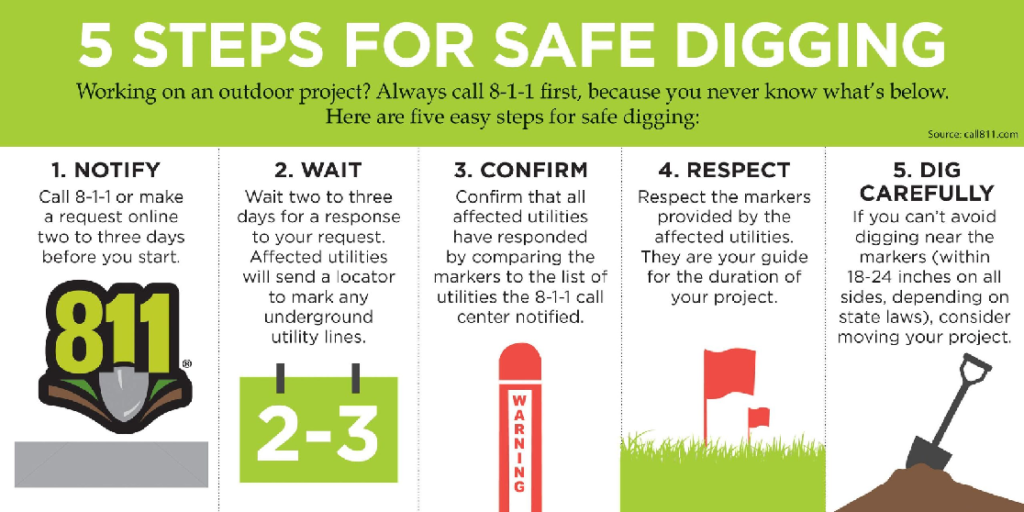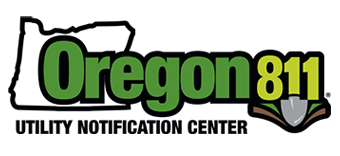With spring officially here, homeowners and landscape professionals alike will be reaching for their shovels to start digging projects — from planting trees and creating garden beds to installing new mailboxes, fences or pools. Before you put your shovel in the ground, don’t miss the critical step that can protect you, your neighbors and the utility services you rely on: contacting 811.
As 58% of American homeowners plan to dig this year — according to research from the Common Ground Alliance (CGA) — contacting 811 before digging is critical to avoid unintentionally striking a utility line. Unfortunately, approximately 34.9 million people across the country will skip this crucial step before starting their project, which can result in inconvenient outages for entire neighborhoods, serious harm to yourself or your neighbors, and significant repair costs.
 Contacting 811 — by making a free call to 811 or, in most areas, a request online — connects you to your local one call utility notification center to have underground utilities marked so that they are not damaged during digging projects. Every digging project, no matter how large or small, warrants contacting 811. Installing a mailbox or fence, building a deck and landscaping are all examples of digging projects that should only begin a few days after calling 811 or submitting a request online.
Contacting 811 — by making a free call to 811 or, in most areas, a request online — connects you to your local one call utility notification center to have underground utilities marked so that they are not damaged during digging projects. Every digging project, no matter how large or small, warrants contacting 811. Installing a mailbox or fence, building a deck and landscaping are all examples of digging projects that should only begin a few days after calling 811 or submitting a request online.
To help keep yourself safe and connected to important utilities, follow these simple safe digging steps before your next project:
1. A free, simple phone call to 811, or a visit to www.811beforeyoudig.com to submit an online request, makes it easy for your local one call center to notify appropriate utility companies of your intent to dig. Contact 811 a few days prior to digging to ensure enough time for the approximate location of utility lines to be marked with flags or paint.
2. Know where you plan to dig and have a basic idea of what you plan to do. When you contact 811, your local one call center will ask you to provide the location and description of your digging project.
3. Your local one call center will notify affected utility companies, which will then send professional locators to the proposed dig site to mark the approximate location of buried utility lines with colored flags and paint.
4: Wait the required amount of time for the lines to be marked. Once all lines have been accurately marked, carefully dig around the marked areas.
There are more than 20 million miles of underground utility lines in the United States, which equates to more than a football field’s length of utilities for every person in the U.S. Your family depends on this buried infrastructure for your everyday needs, including electric, natural gas, water and sewer, cable TV, high-speed internet and landline telephone. With that much critical infrastructure underground, it’s important to know what’s below and contact 811 before digging. To find out more information about safe digging, including links to your local one call center, visit www.811beforeyoudig.com.

Oregon Occupational Safety and Health Division (Oregon OSHA), and Oregon Public Utility Commission (PUC) remind Oregonians to contact 811 before starting projects that require digging.
Whether a professional contractor or do-it-yourselfer, all play an important role in preventing damage to underground utilities. No matter how big or small a project, contact Oregon 811 to avoid life-threatening injuries and prevent costly damage to necessary utility services. There are three easy steps to safe digging in Oregon:
- Submit a locate request at least two business days before starting a digging project at Oregon811.com or by calling 811.
- Wait for utilities to mark the underground lines.
- Dig carefully, paying close attention to the marks.
Once a locate request is made, the OUNC, which operates the free 811 one-call center, notifies the utility companies that serve the area of the planned project. Utility personnel then visit the project site to mark the approximate location of the underground lines, pipes, and cables in the planned digging area at no cost to the homeowner or employer.
Meanwhile, employers must follow Oregon OSHA requirements to protect workers against the potential hazards of underground utilities. Those requirements include:
- Notifying OUNC of the proposed area of excavations at least two working days before starting an excavation.
- Estimating the location of utilities before opening or extending an excavation.
- Determining by safe and acceptable means, the exact location of the estimated utility installations when excavation activities approach them.
- While excavations are open, underground installations must be protected, supported, or removed as necessary to safeguard employees.
Statistics show that a majority of line strikes occur during the warmer months when excavation and construction work is being done. In 2021 an estimated 192,745 unique instances of damage occurred nationwide, 17 percent of which were due to insufficient notice to the 811 service.
To reduce the number of line strikes in Oregon, there are strong local partnerships between OUNC, Oregon OSHA, and the PUC to enhance the communication link and improve safety efforts.
Visit Oregon811.com or call 811 to submit a locate request or to learn more about safe digging practices.
Oregon OSHA offers employers free consultations – no fault, no citations, no penalties – to improve workplace health and safety programs and practices. It also offers free technical help with understanding and applying workplace safety rules.
# # # In 1995, the Oregon Legislature created the Oregon Utility Notification Center (OUNC) to establish a statewide notification system to protect contractors, the general public and buried utilities from damages or injuries caused by excavation activities (ORS 757.547). The free service ensures that operators of underground facilities are notified of proposed excavation so the utilities can be located and marked in advance. For more information about the OUNC or the statewide notification system, go to Oregon811.com.
Oregon OSHA, a division of the Department of Consumer and Business Services, enforces the state’s workplace safety and health rules, and works to improve workplace safety and health for all Oregon workers. For more information, go to osha.oregon.gov.
The Oregon Public Utility Commission (PUC) regulates customer rates and services of the state’s investor-owned electric and natural gas utilities, including Portland General Electric, Idaho Power, Pacific Power, Avista, Cascade Natural, and NW Natural. The PUC also regulates landline telephone providers and select water companies. The PUC’s mission is to ensure Oregonians have access to safe, reliable, and fairly priced utility services that advance state policy and promote the public interest. We use an inclusive process to evaluate differing viewpoints and visions of the public interest and arrive at balanced, well-reasoned, independent decisions supported by fact and law. For more information about the PUC, visit oregon.gov/puc.
